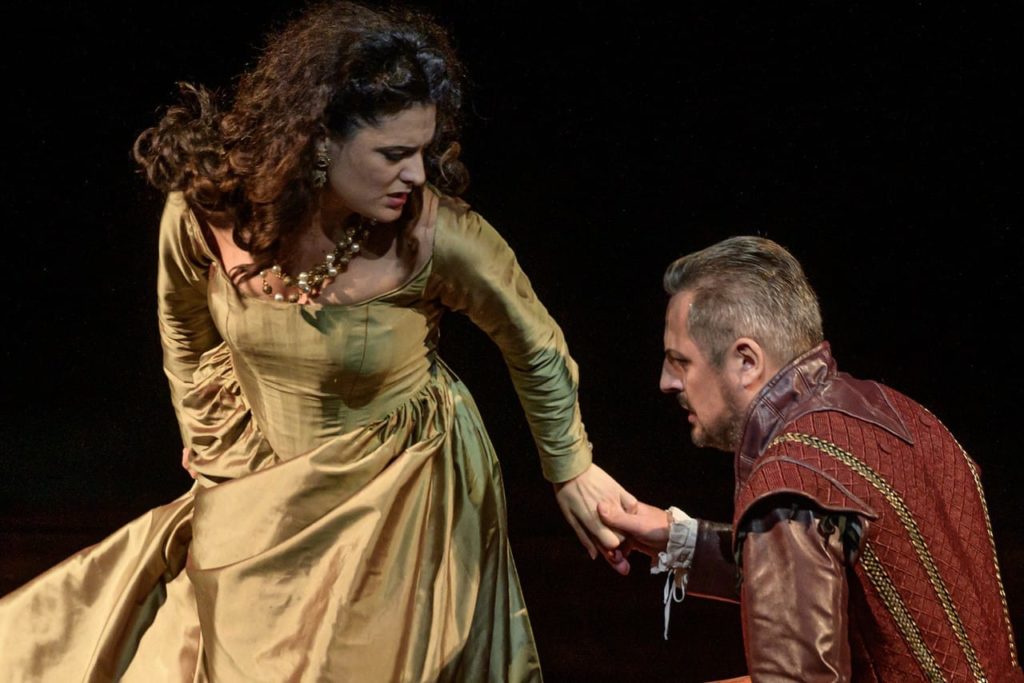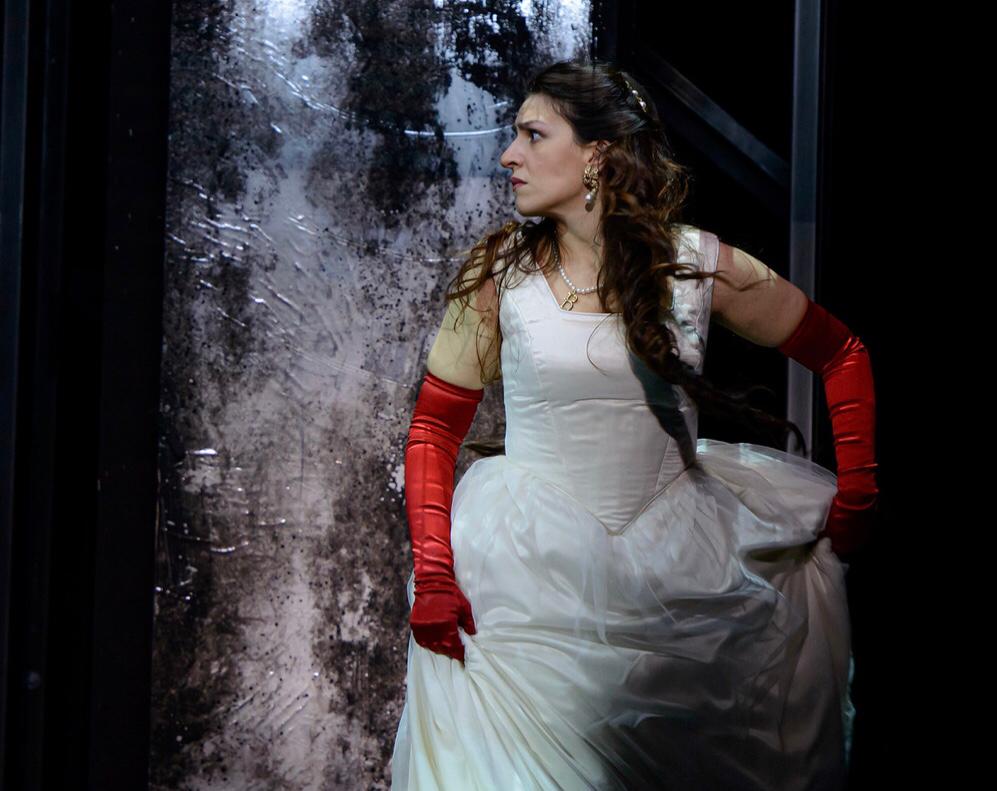
Q & A: Francesca Sassu & Raffaella Lupinacci on Getting COVID-19, ‘Anna Bolena,’ & Returning to the Stage
By Francisco SalazarFrancesca Sassu and Raffaella Lupinacci’s long-awaited debuts at the Lithuanian Opera in “Anna Bolena” proved quite a unique experience for both artists. Namely due to COVID-19.
The Italian singers were set to perform the work for the first time in August until they tested positive for the virus. As a result, the company postponed the opening of the production while Sassu and Lupinacci recovered from the virus.
In October, Sassu and Lupinacci finally made their role debut in “Anna Bolena” and the show went on. For the first time, Lupinacci and Sassu are sharing their story about COVID-19 and revealed how they felt returning to the stage after the virus.
OperaWire: How are you both feeling and how does it feel to get back on stage?
Francesca Sassu: The emotion of returning to the stage is very strong. After so many months of silence, fear, and uncertainty, the joy of returning to celebrate music made me remember why I chose to do this job.
Raffaella Lupinacci: Returning to the stage was very emotional and exciting. I did not feel any particular discomfort in returning after the long pause; the desire to start feeling inside the theater again is certainly great. Singing, in addition to a fascinating passion, is also my job.
OW: Before the opening of the production of “Anna Bolena,” you were ill with COVID-19. What did you feel when you got the positive results? What can you tell about the experience?
FS: We couldn’t believe it. It was bewildering. Raffaella and I are like sisters, we helped each other and were close to each other when we were sick. It was a very difficult moment, mostly from a psychological point of view.
RL: After about 10 days from the beginning of the rehearsals, during a stage rehearsal we received the news that a person connected to the theater had tested positive for COVID-19. Rehearsals immediately stopped and the quarantine began (for me it lasted a month). Around my third day in isolation, the first symptoms began to show. I had a cough, fever, and nausea. I took the swab and tested positive for the virus, but at that point, I wasn’t surprised.
I continued in isolation at home again with the cough, fever, and then lost taste, had hives, and great exhaustion. After the first week of the illness and isolation, the artistic director of the theater, Sesto Quatrini, managed to organize a thorough visit to the hospital for us. It came out that I had had pneumonia, which I had overcome on my own without the need for therapy. Back home, after a couple of days from this first check-up, I began to experience breathing difficulties – I felt my breath blocked, not totally free. I asked to have another hospital check-up: I had pneumonia.
They hospitalized me in the city’s university hospital. After eight days of antibiotics, in massive quantities, and heparin shots, I was finally sent home; in the meantime I was negative. I was very lucky because I immediately realized that something was wrong with my breathing; but what if I had realized it too late? What if they had to intubate me? For a singer, it is great danger!
I want to point out these aspects because I have seen that there is a tendency, even from opera stars, to downplay the danger of COVID-19. I find it to be an unwise and a disrespectful attitude towards those who might be less fortunate. I have never been afraid. I went through several hard moments (both emotionally and psychologically) and I suffered a lot for my family in Italy, who could not help but wait and hope that the situation would not get worse.
OW: What did you do while you were ill with the virus? What kind of attention did you get?
FS: Lithuanian doctors took care of us. They visited and looked after me from home.
RL: During the first 10 days of positivity, when I was still at home in isolation, I naturally avoided any kind of contact with other people and when the fever rose, I took paracetamol: there is not much to do but wait (if there are no complications).
OW: After recovering, were you scared about your voice? When you started singing again, what was that like and how are your voices now?
FS: During the illness, I coughed a lot and my muscles ached. I was never afraid of my voice, but I was worried about muscle recovery. To sing a role like Bolena, you need excellent muscle tone. For this reason, I decided, as soon as the fever was gone, to immediately resume doing exercises through the gyrokinesis method, a technique of movement and specific breathing that has speeded up my recovery a lot. The voice has always been intact and in excellent shape.
RL: I felt that there were no problems in the voice, but, due to the first stages of interstitial pneumonia, my breath was shorter and I could not take deep breaths. After the virus and after antibiotic therapy in the hospital, I felt physically very weak, but thanks to specific and targeted supplements I recovered my energy. The voice, fortunately, was not affected at all.
OW: Knowing you got the virus, what kind of security measures were taken at the Lithuanian Opera on stage? Were you all being tested when you got to the theater? What did you do after leaving the theater?
FS: When I arrived in Lithuania, I was tested with a swab and got a negative result. Unfortunately, the government of Lithuania did not impose security measures such as masks and distancing in theaters, so this is how we got infected. When the production resumed after our recovery, there was no distancing on stage and the opera was performed like before the pandemic. At rehearsals, I always wore a mask and used lots of disinfectants.
RL: As we arrived from Italy, both the first time in August and the second time in September, we were tested with a swab. In the theater, there were no particular safety measures put into place, neither the first nor the second time. Apparently, for the Lithuanian government, given the “few cases,” stringent security measures are not necessary and the theater is adapting to the general trend. Outside the theater, I always wear a mask and avoid crowded places and contacts. I try to live with respect for my health and above all, for others.

OW: This was a big debut for both of you in “Anna Bolena.” Tell me about this work and why it was so exciting to debut this opera in Lithuania?
FS: For me, this was a much anticipated and much-desired debut. Anna Bolena is a character I have read about and studied a lot and I really wanted to make my debut at the Lithuanian National Opera. Maestro Sesto Quatrini invited me and I thank him for his esteem and trust. We have worked hard to make every single detail perfect and I am happy that our work has been rewarded by great success.
RL: It was undoubtedly a very desired and suffered debut, due to the conditions described above. We had little time to work as we are used to, but we invested all our energies in this, with a lot of determination, trying to do our best.
OW: What are the biggest challenges in Donizetti’s score?
FS: Each page is a different challenge. We did the full version so undoubtedly the biggest challenge is holding up – getting to the big final scene with the necessary sprint is not easy. Each page hides a different attitude, therefore a particular vocal characteristic: the greatness of this queen, her fragility, her humanity, her dignity, and her strength are rendered in the score with agility, legatos, different patterns, and dramatic accents. I think having the right voice is not enough: you also need a strong artistic personality to interpret the woman who changed the fate of Europe.
RL: The role of Giovanna Seymour offers a lot of challenges for a mezzo. First of all, the management of a vocal texture often pushing the characteristics of the mezzo-soprano to the limit. It’s very important for expressing the complexity of the character in the best possible way. Giovanna is a contradictory soul. She is a friend, a traitor, a caring person in some ways, but also fascinated by power. She is a simple person but also a Queen. It is a very challenging and satisfactory role.
OW: You both perform a lot of bel canto. How does this score differ from other Bel Canto works you perform? How is the writing different from other Donizetti operas you perform?
FS: In the bel canto operas, the interpreter’s vocal skills are greatly displayed – think of extension, legato, jumps, agility, and dramatic attitude. In this respect, “Anna Bolena” is reminiscent of “Norma,” a role I have interpreted several times. But she is also my first Donizetti queen and I think she is one of the most psychologically and vocally complex characters I have ever faced. I think this debut made me grow a lot as an artist and as a singer.
RL: The Donizetti roles I have played up to now are primarily pants roles. Therefore, the interpretative approach is totally different, as well as the vocal one. The stylistic rendering does not change. The writing of pants roles is more central and in some ways, easier to manage. The preparation is different and the study of the character changes in order to reach the same result: softness, elegance, expressiveness, and beauty.

OW: Tell me about the relationship between Giovanna and Anna. What have you discovered while working on this production? How do you think this opera develops that relationship? What can you tell me about singing the duet?
FS: I believe that there is sincere affection between Anna and Giovanna. Anna sees herself years before, when she too was fascinated by Enrico and, although shocked by this betrayal, she grants her forgiveness, almost as if she wanted to grant it to herself for having done the same to Catherine of Aragon. I think this duet is one of the most intense moments of the whole opera, the engine of all the dramatic tension that will lead to the great final scene.
RL: I find that the relationship between Anna and Giovanna is one of authentic affection and friendship. In the wonderful and very difficult duet, this bond emerges clearly, despite the sense of guilt that devours Giovanna. It is no coincidence that in the last pages of the duet, Giovanna sings a third over Anna, beating repeatedly on A acute and venting on an acute B flat. In these pages we witness a real delirium of Giovanna Seymour: Anna is forgiving her, but she is unable to forgive herself. This symbiosis between music and feeling is extraordinary.
OW: Finally, tell me about your collaboration: what is most exciting about working together?
FS: Raffaella is a great artist. Working with her is always stimulating. I learn a lot from her every time we work together. As for the duet, we managed to find the perfect tension between us in just a few rehearsals. I feel extremely honored to be able to share the stage with her and lucky to have had her as a partner for the debut, despite the difficult circumstances.
RL: Francesca and I have been close friends for a few years now. It was very nice to share this debut as well as the stage with her. There is a lot of understanding and everything is easier and more fun. Our bond also made the long period of isolation and illness in Vilnius much less difficult.


